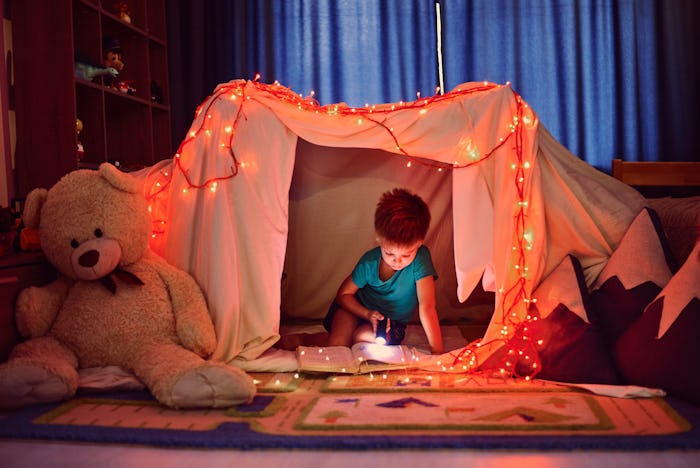Life

The Reason Why Your Kids Ruin Your House To Build Forts & Tents Is So Worth It
My two boys are forever pulling every single cushion off of our couch and stacking them up to build forts. They gather every spare blanket or pillow they can find and hunker down underneath the carefully placed layers while they read, draw, wrestle, or pretend to be on a secret mission to save the world. It is amazing to watch their imaginations come alive and see the sometimes extravagant designs of their forts. They really do love it. But just why do kids love forts and tents so much?
"Oftentimes children feel like they're always being 'nagged' to do things like brush your teeth, do your homework, walk the dog and so on. Being in your own private fort allows for you to get away from the pressures and requests of life, which is a good thing," Maureen Healy, author of The Emotionally Healthy Child and child development expert at Growinghappykids.com tells Romper.
Just like adults, kids sometimes need a break, and having a specific place to escape from the realities and pressures of childhood is what makes playing in a tent or a fort so appealing. "Everyone — children included — need to learn to calm and relax for optimum well-being," Healy continues.
"Boys and girls all need a safe space, which building a fort provides. This is similar to going into your own treehouse or having your own bedroom, which is just for you," Healy says. "Building a fort or playing in a tent provides you freedom. The feeling that you matter, and you have a private life separate from your parents."
And while they're building a fort, kids are also learning how to engage with other children, according to Dr. Michael Mintz, a clinical psychologist for Children's National Health System. "Children are tasked with making a plan for how the structure might stay up, and then to solve problems as the couch pillows or blankets inevitably begin to topple. There is also a social problem-solving aspect of the task, as one child alone cannot typically manage fort-building independently," he tells Romper.
These types of social skills are invaluable and will stay with children through more difficult encounters later on in life when they have to work with school mates or co-workers as adults. "Children learn to work together, putting together a plan, often negotiating different ideas for how the fort might look, then taking on different roles and physically building the fort. There is an opportunity for learning leadership skills, such as by managing different opinions and ideas, reconciling differences of opinion, or relegating tasks," Dr. Mintz says.
Additionally, forts and tents could provide children with a way to relieve stress and provide feelings of security that are not so easily attained in the big, big world kids live in. "Some children are thrilled to be in a tight space, where the feeling of being contained may provide them a sense of security or safety," Dr. Mintz says. "Some children might enjoy the relative darkness or the sense of privacy that the space provides. Other children might enjoy moving about throughout the different spaces or passageways, learning to do so carefully so as not to disrupt the fort."
Not only are kids learning how to interact with others in a healthy way and being provided with a safe space, but they are also engaging in a sensory experience when building a fort. "We are always being stimulated by our five senses, but specifically building a fort focuses on touch, sound, smell, and sight," Healy says. Because kids learn through play, the actions of building a fort help them to learn and grow.
"Fort-building provides young children with the opportunity to engage in pretend and imaginary forms of play. Pretend play and imaginary play are wonderful for children for a number of reasons but, specifically, fort-building provides children with the chance to create their own world, a world in which they are ‘in charge,'" Dr. Mintz says.
So, the next time your kids destroy your living room for the sake of building the ultimate hideout, don't worry about the mess they're making. Instead, remember all of the major emotional and developmental benefits they're gaining by playing in a fort or tent.
This article was originally published on